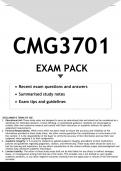CMG3701
EXAM PACK
Recent exam questions and answers
Summarised study notes
Exam tips and guidelines
DISCLAIMER & TERMS OF USE
1. Educational Aid: These study notes are designed to serve as educational aids and should not be considered as a
substitute for individual research, critical thinking, or professional guidance. Students are encouraged to
conduct their own extensive research and consult with their instructors or academic advisors for specific
assignment requirements.
2. Personal Responsibility: While every effort has been made to ensure the accuracy and reliability of the
information provided in these study notes, the seller cannot guarantee the completeness or correctness of all
the content. It is the responsibility of the buyer to verify the accuracy of the information and use their own
judgment when applying it to their assignments.
3. Academic Integrity: It is crucial for students to uphold academic integrity and adhere to their institution's
policies and guidelines regarding plagiarism, citation, and referencing. These study notes should be used as a
tool for learning and inspiration, but any direct reproduction of the content without proper acknowledgment and
citation may constitute academic misconduct.
4. Limited Liability: The seller of these study notes shall not be held liable for any direct or indirect damages,
losses, or consequences arising from the use of the notes. This includes, but is not limited to, poor grades,
academic penalties, or any other negative outcomes resulting from the application or misuse of the information
provided.
, CMG3701
JAN/FEB/2023
UNIVERSITY EXAMINATIONS
JANUARY/FEBRUARY 2023
CMG3701
CLASSROOM MANAGEMENT
THIS IS AN OPEN BOOK EXAMINATION
100 Marks
Duration: 4 Hours
This paper consists of 9 (Nine) pages including a declaration form to be
completed.
Instructions:
This is an open-book examination paper.
There are two sections:
Section A: Introduction to Classroom Management
Section B: Introduction to Education Law
Examiners :
Prof VP Mahlangu
Dr MT Lekalakala
Dr SKC Mataboge
External
Dr N SING (University of Pretoria)
[TURN OVER]
, CMG3701
JAN/FEB/2023
SECTION A: INTRODUCTION TO CLASSROOM MANAGEMENT
QUESTION 1
Read the following paragraph below and answer the question.
At the learner school, district, or province level, data collection, measurement, and
analysis are challenging, to say the least. The South African School Administration and
Management System (SA-SAMS), which is owned by the DBE and offered to schools
without charge, is where the majority of learner level data from all South African schools
are kept. However, historically it has proven to be very difficult to collect and combine
this data at the province, district, and circuit levels. The system hasn't been utilized to its
full potential in previous years because it was constructed on an outdated technological
foundation with insufficient data validation and no connectivity. South African schools are
currently implementing SA-SAMS, a new information system.
1.1. Explain in detail the new information that is being implemented in South African
schools using SA-SAMS. (10)
Read the following statement and thereafter answer the questions below.
1.2 The leadership style of an educator directly impacts on the characteristics and
behaviour of the learners that the educator leads or teaches.
1.2.1 In your own words explain what your understanding is of the statement above. (2)
1.2.2 Choose your leadership style. (2)
1.2.3 Support your response with your preferred style/s of leadership showing how the
leadership style can impact the character of the learners. Your answer should be in a
paragraph form. (10)
Total (24)
[TURN OVER]
2
, CMG3701
JAN/FEB/2023
QUESTION 2
2.1 Briefly define what you understand by parental involvement in the education of learners. (3)
2.2 Mention five important points under the Convening Level (Stage 1) of the framework for
engaging parents in schools which was developed by Singh, Mbokodi and Msila (2004). (5)
2.3 Explain the meaning of self-esteem in your own words and give an example to clarify your
answer. (4)
2.4 Mention 5 barriers to collaboration and participation of parents in the education of their
children and indicate possibilities to address them. (10)
2.5 The models for cooperative learning encourage learners to work together as a group.
Examine the functions of task groups to attain a particular goal. (4)
Total (26)
TOTAL FOR SECTION A= (50)
[TURN OVER]
3





